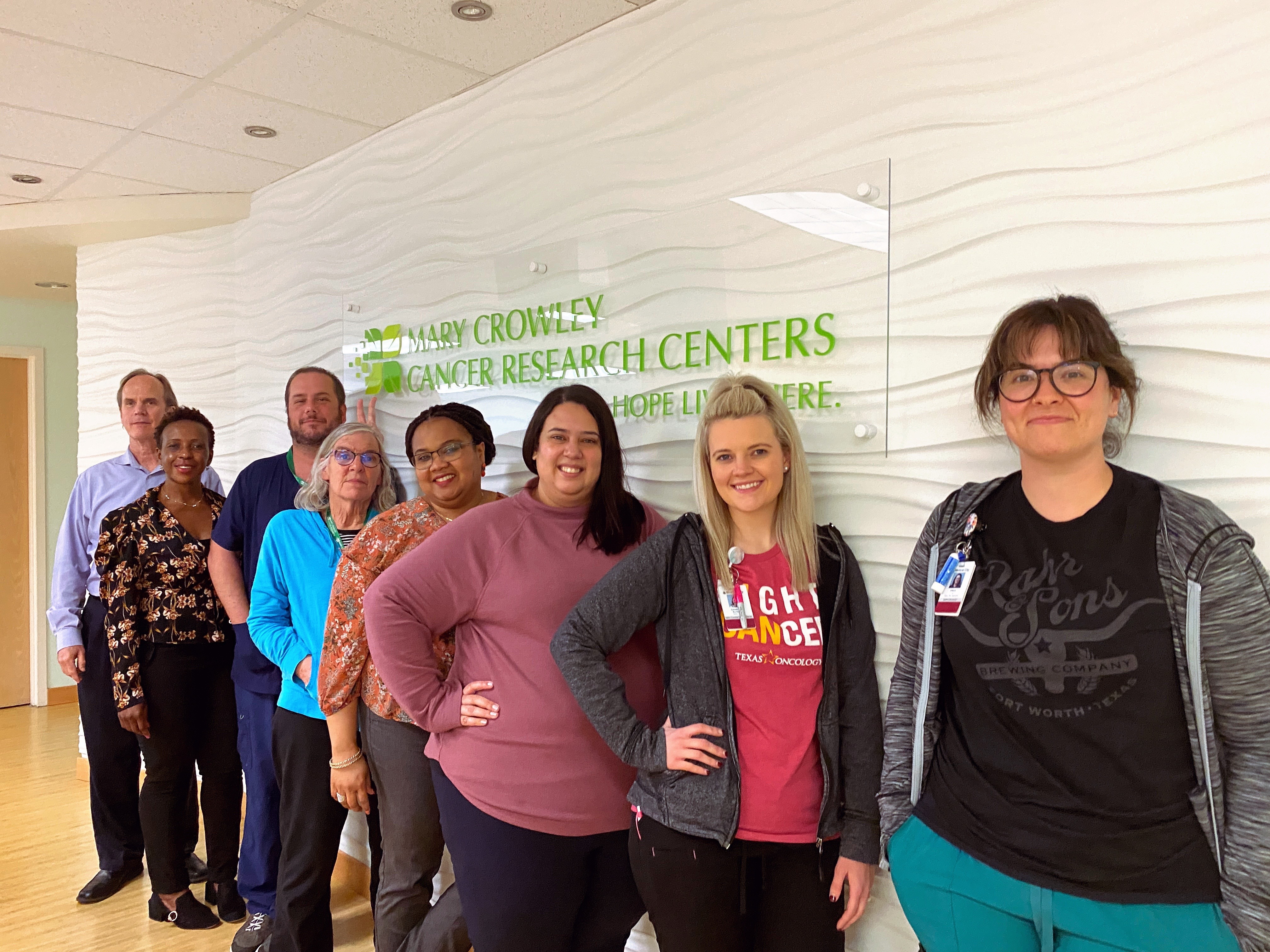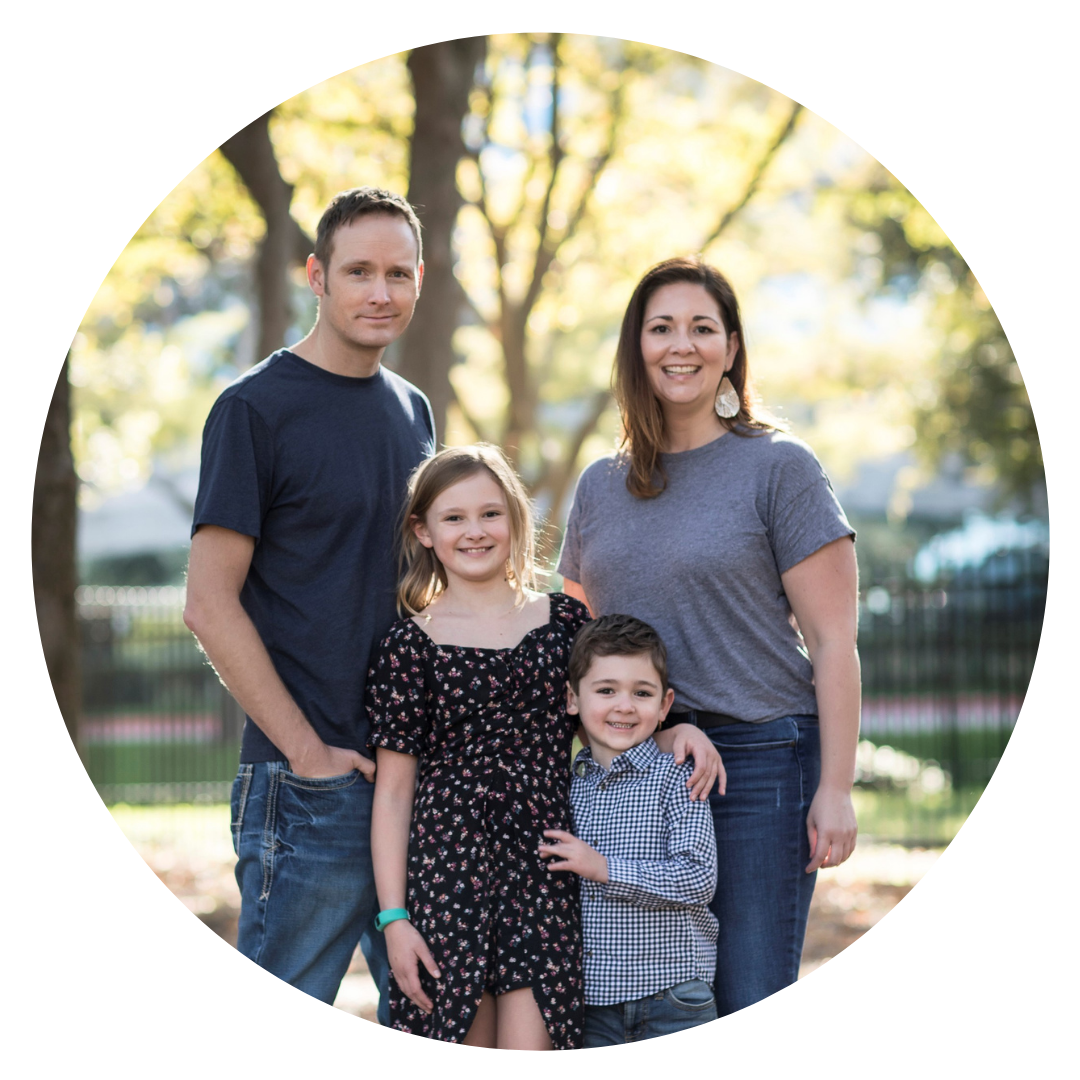Faith, Family, and the Fight for HOPE!
 Jose Perez is a man whose life is guided by Jesus Christ. He was a faithful employee of TXU Energy for the last fourteen years, but before that, he worked as an ordained minister with the Assemblies of God Church for 35 years. In their spare time, Jose and his wife, Yolanda, traveled around the country ministering to people and conducting bible study classes. He was an avid golfer, and when he was not preaching, he was on the links. Then 18 months ago, Jose was diagnosed with Stage IV lung cancer that had metastasized to his lymph nodes, pelvis, and a cancerous lesion on his spine. Fortunately, for Jose, his doctor was Jairo Olivares who, in addition to seeing patients in his practice, also works at Mary Crowley Cancer Research.
Jose Perez is a man whose life is guided by Jesus Christ. He was a faithful employee of TXU Energy for the last fourteen years, but before that, he worked as an ordained minister with the Assemblies of God Church for 35 years. In their spare time, Jose and his wife, Yolanda, traveled around the country ministering to people and conducting bible study classes. He was an avid golfer, and when he was not preaching, he was on the links. Then 18 months ago, Jose was diagnosed with Stage IV lung cancer that had metastasized to his lymph nodes, pelvis, and a cancerous lesion on his spine. Fortunately, for Jose, his doctor was Jairo Olivares who, in addition to seeing patients in his practice, also works at Mary Crowley Cancer Research.
Given the advanced stage of Jose’s cancer, Dr. Olivares immediately prescribed an aggressive line of treatment: Six months of chemotherapy and immunotherapy followed by six weeks of radiation treatments. Jose would spend three days straight at the hospital receiving a double dose of chemotherapy fluid through an IV and immunotherapy. He would rest 21 days, then repeat the treatment. After the chemotherapy treatments, Jose underwent radiation treatments and another round of immunotherapy.
Following months of chemotherapy, immunotherapy, and radiation treatments, the cancer in his lymph nodes was eradicated, and the lesion on his spine went dormant. The tumors in his lung and pelvic cancer shrunk 40%, but the side effects of the treatments were harsh. Jose was bloated, weak and he lost his hair. Unfortunately, after three months Jose’s tumors began to grow again. Dr. Olivares was familiar with trial 19-09 at Mary Crowley that was testing a new immunotherapy drug and referred Jose to see if he qualified.
Jose came to Mary Crowley for a screening, and within two weeks, he enrolled. He began treatments of CTX-471, a drug that stimulates the immune system to attack cancer cells. The treatments helped prevent his cancer from metastasizing and shrank his lung tumor. In December, after three months of treatment, his tumor had reduced by 15%, with minimal side effects. His most recent scan in March 2021 showed his tumor had shrunk an additional 15%, again with minimal side effects.
Jose Perez faced cancer with seemingly inexhaustible energy and optimism. He credits his faith, his wonderful wife, Yolanda, and their blended family for giving him the strength to fight. Jose expressed his gratitude to Dr. Olivares and all of the nurses at Mary Crowley saying, “I thank God every day for Mary Crowley Cancer Research. The doctors, the nurses, the staff, all of them have been so wonderful to me.”
He is still on the trial and his life is starting to get back to normal. He and Yolanda have started traveling around the country again, ministering to people. He retired from TXU Energy so he has time to conduct Bible study through Zoom meetings. He is blessed with six children, 17 grandchildren, and 4 great-grandchildren who they visit as often as they can.
He does have one more goal in mind. “I have not been able to play golf because of pain in my pelvis”, he says, “I want to get back playing regularly. I’m 66 now and I want to shoot my age.”
The Other Cells in the Tumor
 By James Strauss, M.D.
By James Strauss, M.D.
Stimulation of the immune response to cancer with synthetic antibodies has been a significant advance during the past ten years. The first drug developed of this type was ipilimumab. The developers, including Texan James Allison, shared the Nobel Prize in 2018 for this work. Since then, several additional active drugs have been approved as well. Ipilimumab works by interaction with a protein designated CTLA4 on the surface of lymphocytes. The other drugs that have followed interact with a receptor called PD-1 on lymphocytes.
As useful as these drugs have been, many tumors are not sensitive to these treatments.
The effort to find new ways to increase the immune response has led to looking at other cells that may be present in a tumor. Normal cells that can be found infiltrating in the tumor include several classes of immune cells. The immunotherapy agents approved so far interact mainly with a class of immune cells called T lymphocytes. However, NK cells and macrophages are immune cells that often outnumber the T cells in a tumor.
Both NK cells and macrophages have distinct tasks in the reaction of the immune systems to the tumor. When the correct stimulating signals are present, both NK cells and macrophages are capable of killing tumor cells. They can stimulate the response of T lymphocytes as well.
We now have studies with new agents designed to activate NK cells (studies #20-15 and #20-33) and macrophages (studies #20-41 and #21-08). Each of these studies uses a new antibody to target a signal controlling either NK cells or macrophages. These targets, CD96, IL15, TREM1, and LILRB2, are considered to be the possible checkpoint signals for these two classes of immune cells. Enrollment eligibility is open regardless of prior treatment with a PD-1or PD-L1 checkpoint antibody. These are phase 1 studies meaning that they are among the first studies to use these new antibodies. They are open to patients with solid tumors of any type, except for study 20-33, which is focused on the treatment of colorectal cancer and squamous carcinomas of the head and neck.
Misconceptions in Clinical Trials: Facts and Fiction
 By Leah Plato, PA-C, MPH, CCRP
By Leah Plato, PA-C, MPH, CCRP
Clinical trials link scientific discoveries by researchers to new cancer therapies for patients. They offer patients access to the latest innovative treatments while allowing researchers to search for betters ways to manage and treat the disease. Without clinical trials, there would be no advancements in the fight against cancer.
It is important for all patients to be aware that a clinical trial might be an option for them. Misconceptions continue to exist that keep many patients from learning more or participating in clinical trials. Here, we debunk some common myths involving clinical trials.
1. Clinical trial volunteers are merely human guinea pigs.
Many patients are concerned that if they join a clinical trial they will be just a number or a “guinea pig”. In reality, there are many steps to ensure that patients are fully aware of all treatments, side effects, timelines, and study procedures. This process is called informed consent, and patients cannot join a trial before having the trial thoroughly explained, discussing alternative treatment options, and having their questions about the treatment fully address. In addition, the treatment is completely voluntary so patients are also welcome to leave a trial at any time for any reason.
By participating in a clinical trial patients will often learn more about their condition (genetic markers, cell expression, etc.) that aids in their cancer care. They will meet with the research team regularly and are closely followed and cared for by specialists in the field. Rather than feeling like a guinea pig, many research participants feel like they’re part of the research process developing new treatments for the future.
2. Clinical trials are too risky and unsafe.
There are side effects and risks with every treatment including treatment on a clinical trial. These risks are clearly defined and discussed in the informed consent process. Clinical trials are designed first and foremost for patient safety, building in guidelines for physicians to follow including frequent follow-up, lab monitoring, and safety assessments.
3. If you enroll in a clinical trial, you may receive a ‘sugar pill’ and get no treatment at all.
Placebo or “sugar pills” is defined as something that has no intended effect on the cancer. Placebo trials in oncology are very rare. The only time when you will see a placebo-based clinical trial in cancer is if the standard of care is no treatment (observation after surgery, or the completion of all SOC treatment). This is clearly stated in the informed consent and will be fully reviewed, discussed, and signed by the participant before starting the treatment. You will always be informed if the trial you are participating in has a possibility for a placebo.
4. Cost of treatment on a clinical trial is very expensive and not covered by insurance.
Federal law required insurance companies to cover routine (standard of care) costs while enrolled in a clinical trial. These are things that would be done during treatment if you were not enrolled on a trial (regular blood work, radiology tests, some doctors’ visits). Things that are required specifically for the clinical trial such as biopsies, eye exams, ECHOs, or other specific safety assessments will be covered by the study sponsor.
5. If there is a clinical trial that might help me, my doctor will tell me about it.
Your doctor may not know about all available clinical trials that might benefit you. The National Institutes of Health has an online database that you, your family, or your doctor can search to find appropriate trials. Alternatively, it’s often worth making contact with a patient advocacy organization to help you navigate the process. Many of them have tailored services that can help you with your search and help you understand the options.
If you are thinking about participating in a clinical trial and have additional questions, you should talk to your doctor or a patient advocacy organization for your disease or condition.
To see the clinical trial options available at Mary Crowley, please visit: https://www.marycrowley.org/clinical-trials/.
Communities Foundation of Texas Sends Support During Pandemic
 Mary Crowley Cancer Research has received a grant of $9,000 from Communities Foundation of Texas through the second phase of the North Texas Cares application process. Mary Crowley will use the funds from this proposal towards the opening of another clinical trial for waiting cancer patients, who still need access to innovative therapies. Mary Crowley has kept our clinic doors open to patients who need us throughout this pandemic. Thank you, Communities Foundation of Texas, for your support during this challenging time!
Mary Crowley Cancer Research has received a grant of $9,000 from Communities Foundation of Texas through the second phase of the North Texas Cares application process. Mary Crowley will use the funds from this proposal towards the opening of another clinical trial for waiting cancer patients, who still need access to innovative therapies. Mary Crowley has kept our clinic doors open to patients who need us throughout this pandemic. Thank you, Communities Foundation of Texas, for your support during this challenging time!
Pushing Hope Annual Marine Industry Charity Tournament
 The big pink barge is back! We are thrilled that the Pushing Hope Annual Marine Industry Charity Tournament will take place this year August 19 - 21 in Kirkwood, MO. This incredible event has raised over $1 million for Mary Crowley Cancer Research as they return year after year to bring HOPE to the patients that need it. Visit our events page to learn more!
The big pink barge is back! We are thrilled that the Pushing Hope Annual Marine Industry Charity Tournament will take place this year August 19 - 21 in Kirkwood, MO. This incredible event has raised over $1 million for Mary Crowley Cancer Research as they return year after year to bring HOPE to the patients that need it. Visit our events page to learn more!
Crowley-Carter Foundation Grant
The Crowley-Carter Foundation awarded Mary Crowley Cancer Research with a grant of $125,000. These funds will support opening additional combination therapy clinical trials for cancer patients. The rationale for combination therapy is to use drugs that work by different mechanisms, thereby decreasing the likelihood that resistant cancer cells will proliferate. When drugs with different effects are combined, each drug can be used at its optimal dose while minimizing side effects. Using more than one drug at a time makes it possible to target several processes in a cancer’s growth at the same time, stopping it through multiple pathways. This methodology is increasingly popular as oncologists look to pair chemotherapy or radiation with vaccines, therapies, and more. At the same time, each of these therapies must still first go through the clinical trial process individually for safety and dosage before it is then paired as a potential combination therapy. Mary Crowley’s unique expertise allows us to test these treatments both as a monotherapy first, and later as part of a combination therapy. This generous grant from the Crowley-Carter Foundation allows Mary Crowley to continue these combination therapy clinical trials and offer HOPE to our precious cancer patients.
THANK YOU Crowley-Carter Foundation!
North Texas Giving Day
 North Texas Giving Day is right around the corner! We hope you’ll plan to join us on September 23rd with a gift to help open more cutting-edge clinical trials right here in North Texas.
North Texas Giving Day is right around the corner! We hope you’ll plan to join us on September 23rd with a gift to help open more cutting-edge clinical trials right here in North Texas.
Together, we can achieve our mission to bring hope to cancer patients through innovative clinical trials while advancing treatment for patients in the future.
Oncology Nursing Month
 In May, we celebrated our nursing staff for Oncology Nursing Month. This dedicated and compassionate team of professionals always puts their patients first.
In May, we celebrated our nursing staff for Oncology Nursing Month. This dedicated and compassionate team of professionals always puts their patients first.
Thank you, nurses!
Easy Ways to Make a Gift!
 Did you know that donating to Mary Crowley is as easy as buying your groceries and ordering on Amazon?
Did you know that donating to Mary Crowley is as easy as buying your groceries and ordering on Amazon?
- Link your Kroger Plus Card at www.kroger.com/account/enrollcommunityrewardsnow.
- To link your Tom Thumb Reward Card, visit the Customer Service counter at your local store to complete a program form and fill in Mary Crowley’s charity number, 13757.
- Select Mary Crowley Cancer Research when shopping on AmazonSmile, and 0.5% of your purchase price will be donated.
Of course, you can always make a gift right here on the website as well!
5 Questions with Jennifer Sala, MBA
 Vice President of Compliance
Vice President of Compliance
1. Where did you grow up?
I grew up in Cheyenne, Wyoming, home to the world’s largest outdoor rodeo and western celebration. I moved to Texas right after graduating High School and have been here ever since.
2. How did you first hear about Mary Crowley, and what made you interested in working here?
I learned about Mary Crowley when I had just graduated from UTD and was searching for a place to begin my career. I didn’t know anything about clinical trial research at the time but was drawn in by the story of Mary Crowley, and the mission of the organization. I have always been proud to be a part of an organization that is so focused on the people we serve.
3. What is your favorite part of your job?
Contract negotiation and compliance can be full of dry tasks. I enjoy the fact that much of what we do in our department is finding a way to put a puzzle together with pharmaceutical companies to ensure we can get a fair contract negotiated to open clinical trials as quickly as possible. This can take maneuvering, but the act of uncovering ways to put those pieces together is fun! I also enjoy being a small part of a larger team that serves our patients and community. I take a great deal of pride in playing a tiny role in what we do here at Mary Crowley.
4. What do you enjoy doing in your free time?
I love spending time with my family, spending time outdoors, and traveling (hopefully doing this again soon!). I enjoy learning about the different cultures in the areas we travel, and sharing those experiences with my kids.
5. How will you help bring HOPE to Mary Crowley patients?
Mary Crowley brings HOPE to patients every day. I want to continue to play any role I can to help in this mission to continue the important work we are doing.


